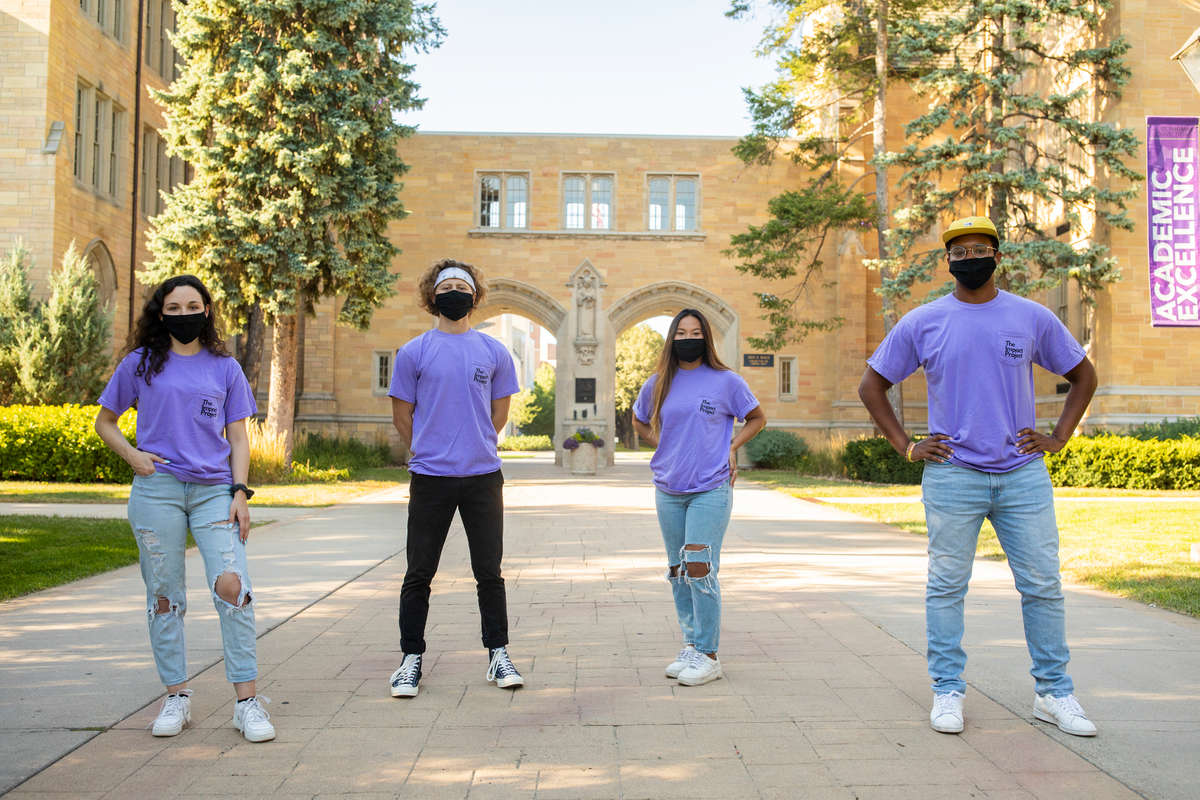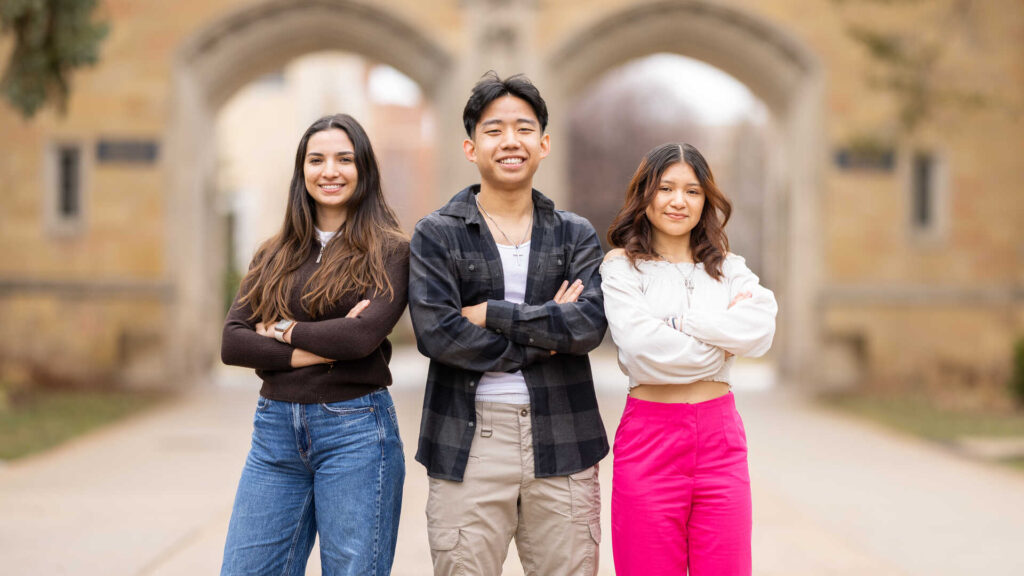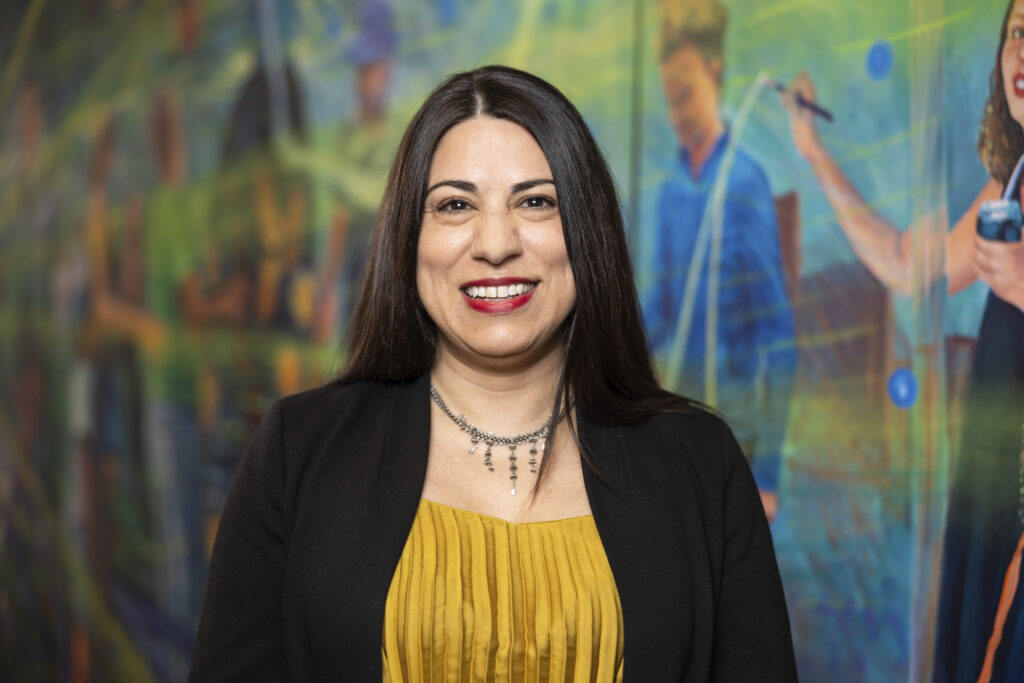The Impact Project is a socially conscious start-up of students that is raising awareness and support for racial justice and community building within St. Thomas. Any undergraduate student can apply during the spring semester through the Student Alumni Council (SAC) to be an ambassador for The Impact Project.
The main focus of the student-led movement is to raise awareness, support and funds for different initiatives on campus each year. This year, the Impact Project is partnering with the Office for Diversity, Equity and Inclusion (ODEI) to bolster its work toward racial justice at St. Thomas.
“I was excited to learn about The Impact Project and its vision to uplift student voices in amplifying causes that students care about on campus,” said Kha Yang, the associate vice president for inclusive excellence and ODEI director. “I am honored that The Impact Project has selected to partner with the Office for Diversity, Equity and Inclusion to amplify racial justice initiatives on campus particularly during these difficult and unprecedented times.”
The Newsroom connected with staff who run the 2018-created Impact Project to learn more about the program and their passion for diversity, equity and inclusion. Here are highlights from our interview with Annual Giving and Alumni Engagement Coordinator Lucas Williams and Student Director of The Impact Project Jack Maxwell ’21.
How did The Impact Project come to be?
LUCAS: A couple of years ago, we were trying to think of different ways to engage students in different areas of their community each year. Like a lot of other universities, we ran a senior class gift campaign, but participation was dwindling. We saw this as an opportunity to launch a new program to engage students in philanthropic causes on campus they deeply care about. We modeled The Impact Project after a socially conscious start-up, wherein students would pick a cause on campus that they were interested in, and we’d sell a limited-edition item to raise funds for the cause. This year we’re selling T-shirts to support racial justice initiatives.
How would you explain The Impact Project to a friend who might not be aware of it?
JACK: The Impact Project strives to bring awareness to current problems in our community, whatever that may be; sustainability and mental health in recent years, and now racial justice. Our goal is to better our community by elevating voices and empowering St. Thomas students to create change. I want us to have a deep understanding of the inequities around us, with the drive to change them.
Why do you want people to be involved in the organization?
JACK: The Impact Project, through the Student Alumni Council, is a great way to engage in conversations you may not have elsewhere on campus. I want my fellow students to be more engaged with the message we are sharing. Building a united front, with strength in numbers, makes change possible. The Impact Project is meant to amplify voices and issues we deal with. I want our St. Thomas community to stand more closely to our community at large. Minnesota has a lot of positive energy and I want us to be a part of it, be a part of the solution. I want us to have a deep understanding of the inequities around us, with the drive to change them.
How do you achieve your goals as an organization?
LUCAS: Our three main pillars are Educate, Engage and Connect. We’re helping students educate themselves and each other about racial justice at St. Thomas and in Minnesota. We’re urging them to engage with the efforts of the Office for Diversity, Equity and Inclusion, as well as being active citizens in their wider communities. We’re also connecting them to the Office for Diversity, Equity and Inclusion for events and opportunities to hold conversation with St. Thomas community members.
JACK: We provide an additional avenue of resources, i.e., books, articles, podcasts and documentaries, so that our community can learn more about racism and injustice in our own community.
Do you plan events? Are there any upcoming?
LUCAS: The Impact Project doesn’t plan events – we amplify existing opportunities across campus. This year we’re raising awareness about events put on through the Office for Diversity, Equity and Inclusion, as well as Student Diversity and Inclusion Services. One event we want to highlight is the “Equity in Action: Cultivating Antiracist Universities” conference on April 26 featuring Professor Ibram X. Kendi as keynote speaker. This event is being put on by the Office for Diversity, Equity and Inclusion, and attendance is complimentary to all St. Thomas students, faculty and staff. For future events and opportunities, check out our Instagram!
Why is it important to raise awareness about social injustices?
JACK: Minnesota has ties to structural racism. We are not ‘above the problem’ because we’re a northern state. Before we can fight the problem, we need to acknowledge its existence! From there, we want to engage with our community by encouraging fellow Tommies to vote, not just for themselves, but with their community in mind.
We want to encourage students to support BIPOC businesses in Minneapolis-St. Paul and throughout the states. We want to help others realize where we spend our money has importance and if we change that, systems may change as a response. Finally, to connect. We want to connect Tommies within our community by promoting events sponsored across campus that further dialogue and action.
Why did you become involved in the Impact Project?
LUCAS: I’ve always tried to center social justice in my work. Our department is focused on student philanthropy engagement. There are many social causes on campus that rely on funding to make a significant impact on the St. Thomas community, so my fundraising work with students goes hand in hand with supporting social justice causes on campus and making students feel heard.
JACK: I was never the most involved person on campus earlier in my education here at St. Thomas, but for my final year I wanted to do something – to attempt to make an impact at my school before I graduate. I found out about the Student Alumni Council from a colleague my junior year and decided to apply for this job the coming year. As the student director, I manage our social media account. We work collaboratively with other areas on campus to highlight events and opportunities to learn more about our cause and engage in their community.
Why is The Impact Project important to you personally?
JACK: It’s important to me because of the mission this year. Don’t get me wrong – I’m glad for our work in previous years, but this year is different. We are dealing with systemic issues in our society that have been around since slavery. The game stayed the same, they only changed the name. The problems in America must be confronted and dismantled, and I’m proud to advocate for changing how we operate as a country.
Structural racism exists in just about every industry, business or organization. It exists at St. Thomas. I’ve seen racist acts here on campus that sickened me. I want to be a part of the solution. It isn’t an overnight fix, but if you don’t try, you’ll never solve a thing. Focusing on the big picture can be overwhelming, so we’re helping students see what they can do in a micro sense at the university level. We’re starting from the bottom up.
What are some other ways in which you raise awareness?
LUCAS: In addition to providing education about a new cause, we sell a limited-edition item to the St. Thomas community to promote and raise financial support for the cause. The item is always priced around $20-$25, and all proceeds benefit that year’s focus. This year, our limited-edition item is a shirt, and all proceeds from shirt sales benefit the work happening on campus done by the Office for Diversity, Equity and Inclusion.
Through the sale of our shirts, we’re making it easier for students to support the office’s DEI efforts at St. Thomas. Buying a T-shirt is just one way to engage with and support DEI efforts. This year, we also want to highlight great resources and the events that students can use to educate and engage themselves in DEI activism.
How else can others get involved?
JACK: To learn more about DEI work on campus, check out the Office for Diversity, Equity and Inclusion. Follow our Instagram account for resources on unlearning racism and being actively anti-racist. Lead into engaging and connecting with the community with your time, money and energy. This is the true involvement – it’s bigger than us – challenge your friends and family to rethink and hear different perspectives. Just because something doesn’t happen to you doesn’t mean it doesn’t happen to somebody different. Your reality is only what you see, and we need to place value on the realities of our disadvantaged neighbors with the same value we place on our own.







